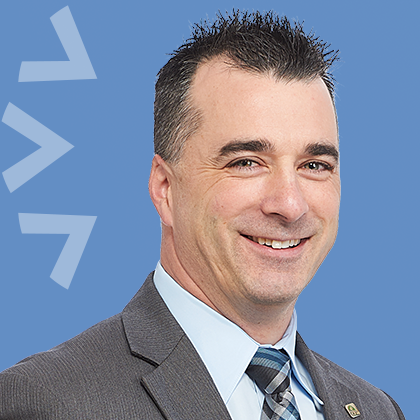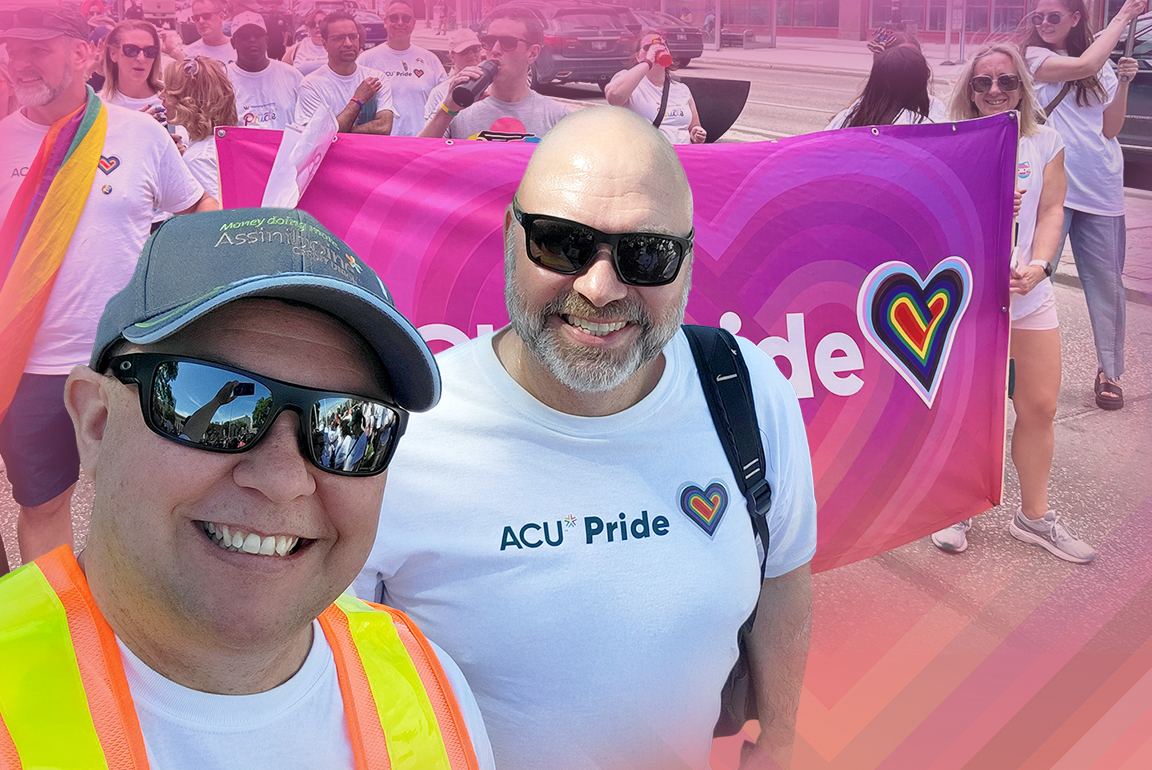How ACU helps its LGBTQ2S+ members invest in themselves and their futures
Despite Canada’s global reputation as a leader of diversity and equality, LGBTQ2S+ wealth is, on average, lower than the rest of the country because the community has historically faced barriers to accessing financial services.
One of the biggest obstacles is income disparity. A 2021 study from The Social Research and Demonstration Corporation (SRDC) showed heterosexual males in Canada:
- earn more than gay men, lesbian women, bisexual men and bisexual women
- are more likely than members of sexual minority groups to be employed and have full-time work
- make $35,000 more per year than bisexual women, the largest income gap revealed by the research

Being underemployed and underpaid can also make it difficult for lesbian, gay, bisexual, transgender and queer people to plan for their financial future. A 2017 survey suggested that, in Canada, wealth among LGBTQ2S+ people trailed behind their straight counterparts in terms of:
- saving habitually
- being financially ready for retirement
- having a developed retirement plan
- feeling able to understand matters related to retirement planning
ACU works to build LGBTQ2S+ wealth for its members by ensuring they can access the financial services they need and plan for their financial future. Here’s how we do that.
Feeling accepted in your financial conversations
Getting your finances in order often means sharing details of your life circumstances. For some members of the LGBTQ2S+ community, that’s extremely daunting, says Steven Bennett, Financial Account Manager at ACU.

“It’s a big thing to share that you have a same-sex partner or that you’re transgender. Those are scary things to share with strangers. So maybe part of the barrier that exists for folks in our community is that they’re feeling too intimidated to ask for help with their finances,” says Steven, who shared that he’s a gay married man celebrating his nineteenth year of working at ACU.
Steven shared two simple gestures — respecting preferred names and pronouns — can have a profound impact on erasing the intimidation factor. When unsure of an ACU member’s preferred name or pronoun, he makes a point to ask and use the correct one. For non-binary, transgender and others in the LGBTQ2S+ community, this acknowledgement and respect is important, especially when that information differs from their legal I.D.
“It’s important. That’s part of one’s dignity as a person, to be addressed in the way that they identify,” Steven continues. “It also reflects on ACU in terms of the kind of service that we offer from a professional point of view.”
Awareness and empathy
Although Steven has been using preferred names and pronouns with non-binary or transgender ACU members for several years, he’s appreciative of the fact that ACU included the issue in its most recent diversity and inclusion training for employees. He notes that the credit union has worked closely on that programming over the past two years with one of its community partners, the Rainbow Resource Centre.

“I’m a gay man who’s married with no kids, so we’re in a position where we can save money,” Steven explains further. “But not all people in our community are necessarily in that position. If you’re a transgender person, for example, there might be a lot of barriers because you’re working on getting your name legally changed or are getting gender-affirming care. So maybe a lot of your wealth is being invested in becoming the person on the ‘outside’ that you already are on the inside. All those things cost money.”
Steven adds that for same-sex couples or transgender people who want to have kids, savings and expenses are also important considerations. “Adoption is not an inexpensive option and fertility treatment is even more expensive,” he acknowledges.
Planning for the future

Planning even further ahead for the future can also raise very specific issues for members of the LGBTQ2S+ population, says Ryan Fontaine, Senior Investment Advisor at Aviso Wealth.
“In a lot of cases, tax laws have just not caught up to the changing diversity of Canada’s population,” Ryan says.
That means some laws may affect LGBTQ2S+ families differently than ‘traditional’ families consisting of a married heterosexual couple with children. In light of that, he says certain areas of financial planning may require a closer look for LGBTQ2S+ clients, such as:
- income splitting: This can generate tax advantages for couples and minimize estate costs if one partner passes away
- estate planning: Ryan says designating beneficiaries for assets is very important for LGBTQ2S+ couples who have no children. “If one partner passes away, what is going to happen to the assets that couple has accumulated together?”
Ryan says that questions like this are really important.
Although Ryan often explores such issues with all his clients, he stresses “there may be a bit more importance and urgency in LBTQ2S+ relationships where there are no kids.”
Tips for LGBTQ2S+ people to build wealth
Here are Steven and Ryan’s top tips to help grow LGBTQ2S+ finances.
- Try to live within your means and pay yourself first.
- Start saving as early in your life as you can.
- Be very aware of your financial situation and define your end goal.
- Share your goals and dreams with a financial advisor so they can give you suggestions on how to improve your finances.
- Don’t be afraid to ask for help with your finances
The first step is reaching out for help from the experts.

Our ACU financial advisors are here to answer all your questions about investing and building wealth as a member of the LGBTQ2S+ community.
We’d love to hear from you.

Mutual funds and other securities are offered through Aviso Wealth, a division of Aviso Financial Inc.
Mutual funds and other securities are offered through Aviso Wealth, a division of Aviso Financial Inc. Commissions, trailing commissions, management fees and expenses all may be associated with mutual fund investments. Please read the prospectus before investing. Unless otherwise stated, mutual fund securities and cash balances are not insured nor guaranteed, their values change frequently and past performance may not be repeated.
The information contained in this article was obtained from sources believed to be reliable; however, we cannot guarantee that it is accurate or complete. This material is for informational and educational purposes and it is not intended to provide specific advice including, without limitation, investment, financial, tax or similar matters.
Up Next
Sustainability: How ACU is turning words into action
A hand holding a seedling
For ACU, Pride radiates outward
“I’ve always wanted to instill a change in the world for the better,” says Cristina McCourt, Financial Account Manager Trainee and member of the ACU Pride Committee, an employee-led resource…
Royal Aviation Museum travels to its final destination—with ACU’s help
A stone’s throw from the main terminal of Winnipeg Richardson International Airport you’ll find one of Canada’s hidden gems, where the airplanes are a little more exciting than your typical…




